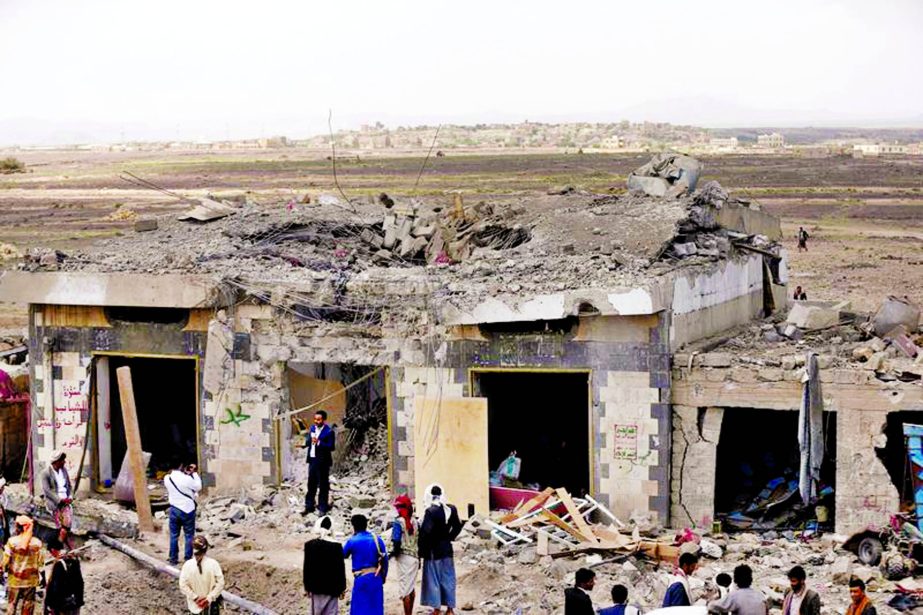
Independent :
Saudi-led coalition air strikes near the Yemeni capital of Sanaa have killed an estimated 60 people and injured 13 after hitting a hotel, officials in the country have said.
Dozens of Shia Houthi rebels as well as civilians were among the dead, officials told the AP on Wednesday on condition of anonymity. Eyewitnesses, including a medic, said the two-storey
hotel in Arhab, 35 kilometres (22 miles) north of Sanaa, had been completely destroyed in the attack, leaving two bodies hanging from the upper floor. Many were still being retrieved from the rubble.
A second strike hit a checkpoint controlled by Houthis a few kilometres away, and several more had been conducted overnight, a local medic told Reuters.
It was not immediately clear why the Saudi-led jets had targeted the hotel. A representative for the Saudi-led coalition did ont respond to immediate requests for comment.
Saudi Arabia and its regional partners have used Iran’s influence over Yemen’s Houthi rebels to justify an extensive bombing campaign since March 2015.
The air strikes, carried out at the request of the exiled internationally recognised Yemeni President Abdrabbuh Mansour Hadi, have been repeatedly criticised for causing unnecessary loss of civilian life. The bombing of a funeral gathering mistaken for a military target killed 140 people in October last year. A report authored by several international aid agencies released last week said Yemen suffered more air strikes in the first half of this year than in the whole of 2016, increasing the number of civilian deaths and forcing more people to flee their homes. Western governments have also faced criticism for their role in the war: arms sold to Saudi Arabia are destined for use in the Yemeni war, rights groups say. Yemen’s conflict has left around 70 per cent of the 27-million strong population now reliant on some form of humanitarian aid. A total of 14.5 million people don’t have regular access to clean water, 7.3 million live on the brink of famine and more than 500,000 people have been infected by the worst cholera outbreak in modern history.
Saudi blockades on Yemen’s ports and airspace have been blamed for creating the humanitarian crisis and adding to the misery by holding up desperately needed food, medicine and other supplies from entering the country. Air strikes have also been known to hit hospitals and other vital civilian infrastructure.
Saudi-led coalition air strikes near the Yemeni capital of Sanaa have killed an estimated 60 people and injured 13 after hitting a hotel, officials in the country have said.
Dozens of Shia Houthi rebels as well as civilians were among the dead, officials told the AP on Wednesday on condition of anonymity. Eyewitnesses, including a medic, said the two-storey
hotel in Arhab, 35 kilometres (22 miles) north of Sanaa, had been completely destroyed in the attack, leaving two bodies hanging from the upper floor. Many were still being retrieved from the rubble.
A second strike hit a checkpoint controlled by Houthis a few kilometres away, and several more had been conducted overnight, a local medic told Reuters.
It was not immediately clear why the Saudi-led jets had targeted the hotel. A representative for the Saudi-led coalition did ont respond to immediate requests for comment.
Saudi Arabia and its regional partners have used Iran’s influence over Yemen’s Houthi rebels to justify an extensive bombing campaign since March 2015.
The air strikes, carried out at the request of the exiled internationally recognised Yemeni President Abdrabbuh Mansour Hadi, have been repeatedly criticised for causing unnecessary loss of civilian life. The bombing of a funeral gathering mistaken for a military target killed 140 people in October last year. A report authored by several international aid agencies released last week said Yemen suffered more air strikes in the first half of this year than in the whole of 2016, increasing the number of civilian deaths and forcing more people to flee their homes. Western governments have also faced criticism for their role in the war: arms sold to Saudi Arabia are destined for use in the Yemeni war, rights groups say. Yemen’s conflict has left around 70 per cent of the 27-million strong population now reliant on some form of humanitarian aid. A total of 14.5 million people don’t have regular access to clean water, 7.3 million live on the brink of famine and more than 500,000 people have been infected by the worst cholera outbreak in modern history.
Saudi blockades on Yemen’s ports and airspace have been blamed for creating the humanitarian crisis and adding to the misery by holding up desperately needed food, medicine and other supplies from entering the country. Air strikes have also been known to hit hospitals and other vital civilian infrastructure.

